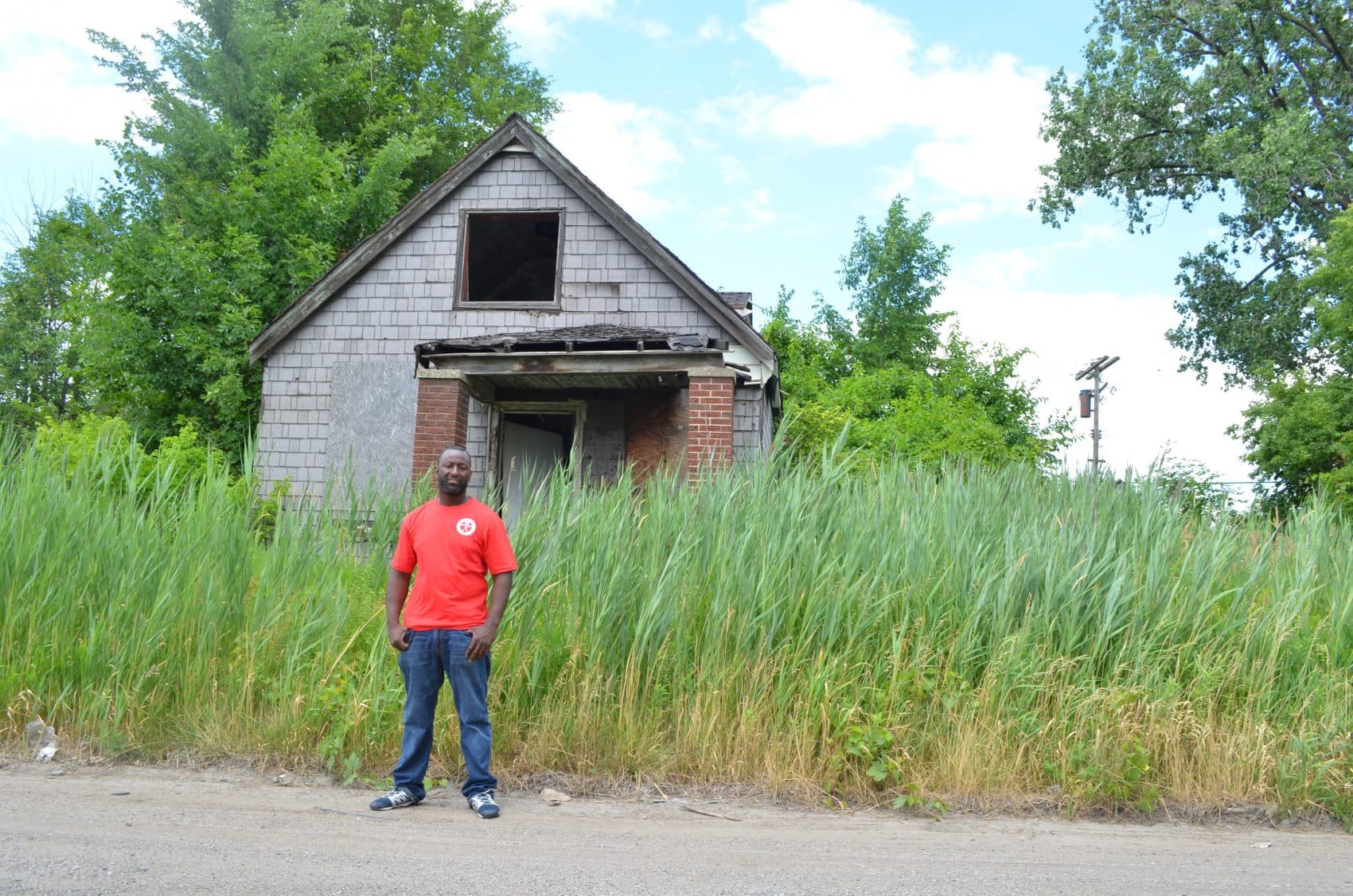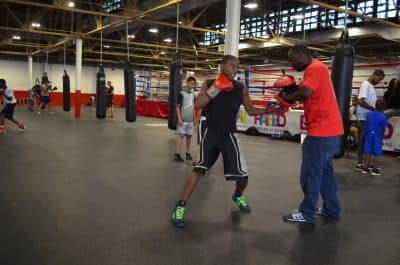Advertisement
In Detroit, One Boxer Tries To Fight Violence
Resume
Khali Sweeney and I are standing in front of an abandoned house.
"On this street, it was like a dirt road street," Khali says. "I thought it was the only dirt road street left in Detroit."
The house’s windows are boarded up, its roof crumbling and its door falling in. It’s tiny — just one small floor and an attic. It’s the only house left on the block across the street from the Strong Steel Plant; tall grasses and weeds grow where other houses once stood.
"I can’t believe this house is still here," Khali says.
This house was his childhood home.
"My biological mother — she dealt with drug addiction her whole adult life," Khali says. "Cleanliness is not the top priority and responsibility is not a top priority, so I’ve been left in houses, you know, in my own diapers and trash, knee-high.
"A child didn’t fit into that lifestyle, so she ended up giving me to some fine people in the neighborhood," he says.
"I was standing on the side of a house, and a guy shot 30-something rounds from an assault rifle, and I didn’t get hit and everything behind me was shot all up. My life is here for a purpose, and I know it."
It was an informal adoption; it didn’t involve any paperwork. Khali’s adopted family included parents, aunts, uncles and cousins. It was this adopted family that taught Khali how to box. Two of his cousins were good enough boxers to go pro, he says, but their careers were cut short: one by high blood pressure, and the other because he landed in prison.
"In this house right here that we’re standing in front of, they would start at that corner down there, my cousins, and they would run five miles around this whole plant right here," Khali says. "I would get up and run with them, too. And then they would shadow box. And so that was my passion."
Finding An Escape
Boxing was a welcome escape from everything else in Khali’s life. His biological family was splintered. His mother was in and out of the picture. His brother was being raised by his grandmother across town. And Khali struggled in school.
"In the third grade, I realized that I couldn’t read and write," he says. "Before you knew it, I was in the 11th grade. Still never learned how to read and write. Never."
So Khali dropped out of school.
"I had nothing going for myself," he says. "I had no education. You know, if I can cut some grass somewhere or somebody was painting a house or something — pretty much a bum, asking other people for handouts, basically. I was in the street life, the street culture. You’re talking about running with gangs. You know, you hanging out with some pretty shady characters."
I asked Khali if he was involved in any drug dealing, and he made faces at the microphone. What he did tell me was that, during this part of his life — his early 20s — he was basically jobless and homeless. One day, he visited his older brother’s house, and his brother pulled out a photo, taken when Khali was a teenager.
"They was all of my friends," Khali says. "We were going to go skating in Pontiac, Michigan, and so it was like 30 guys in front of my house or more — or more. He’s like, 'He’s dead, he’s dead, he’s in jail, he’s in jail, life, life, dead, life, on the run. They looking for him, they looking for him.' I’m like, 'Wow.' Then I started thinking, like, 'Man, I have to change my life.'"
A Gym Of His Own
Khali went back to school and got a steady job in construction. He saved up enough money that he could stop bouncing around and start renting a hotel room by the week. Then he turned and looked back at the neighborhood he’d come from.
"So then I started thinking to myself, like, 'If somebody would have got to me when I was young and would have got to most of my friends when they were young, they wouldn’t have went through what they went through. They wouldn’t have went to prison. They wouldn’t have been killed at an early age.' You know what I mean?" Khali says. "So I said, 'Let’s start talking to the young guys.' So that's when I started thinking, 'How can I get these young guys’ attention? What do I know how to do that I can help these guys?'"

Khali started teaching a couple of kids how to box in a park near his house — but you can only learn so much by shadow boxing. They needed a boxing gym, so he signed a lease. He tried to make ends meet by selling boxing lessons to adults so he could teach the kids for free. But he wasn’t bringing in enough cash, so he moved out of his house and into his car and he used his own money to pay the rent. After that, he sold his car and started sleeping in the gym. He was willing to make all those sacrifices to help the kids avoid what he’d been through.
"I was given chance after chance after chance," Khali says. "I was sitting in a car that got shot 26 times and only got shot one time and lived. I was standing on the side of a house, and a guy shot 30-something rounds from an assault rifle, and I didn’t get hit and everything behind me was shot all up. My life is here for a purpose, and I know it."
Khali’s purpose isn't just teaching the kids how to box. He also feeds them an after school snack when they arrive and dinner before they leave. For some of them, it's their only meal of the day. And he has tutors on hand to help the kids with their schoolwork — which they have to finish before they're allowed to box.
"These kids are so much like me, it’s unbelievable," he says. "I had kids in there who couldn’t read; I had kids in there who hadn’t eaten; I had kids in there who had serious life problems going on."
But, when Khali asked potential donors for money, he didn’t talk about those life problems — his or the kids'. He just said he was providing a safe space for kids after school. That’s why, even with all his sacrifices, Khali was running out of money and knew that, soon, he’d have to close the gym.
"You know, 'cause I didn’t know how to tell the story, you know what I mean? Cause I just — I thought it was like me; when you don’t read and write or you're having trouble with schoolwork that you kind of hide that," he says. "I thought you were supposed to hide that, so I was never telling anybody about that. I was like, 'Oh, we’ve just got a boxing gym.'"
'Don't Hide That'
That’s where Jessica Hauser comes in. In 2010, she came by the gym to take boxing lessons from Khali and saw everything that was happening.
"She’s like, 'No, this is something special,'" Khali says. "And so she’s like, 'You’re feeding kids. That is special. You need to tell people about that. You know, don’t hide that.'"
It was Jessica Hauser who got together the paperwork so the gym could be a non-profit. She helped with fundraising. And, eventually, she became the Downtown Boxing Gym’s executive director.
Today, 120 kids come here every day after school to learn how to box. After they jump rope and run laps, Khali spars with them one at a time, helping them improve their form. There are girls and boys here, 7-year-olds and 17-year-olds, native Detroiters and immigrants.
Since Coach Khali founded the gym in 2007, Detroit’s high school graduation rate has been between 55 percent and 75 percent. But every kid who’s been through the Downtown Boxing Gym has graduated from high school. Khali says it doesn’t just take tutoring; he also has to convince kids that they have a future to look forward to.
"People used to always say to me, 'You fight so much that, man, you going to be dead or in jail before you’re 21,'" Khali says. "So when they said that to me, I took that as a pass to go crazy. You just gave me nothing to live for. I will never tell a kid that. Ever. Instead of saying, 'Hey, son, you going down the wrong path. Let’s make some lifestyle adjustments and get you going in the right direction.'"
Getting the kids going in the right direction is really, really tough.
"I mean, we’ve actually had rival gang members in the same gym," Khali says. "And so we tell them off the top this is a neutral zone. I’ll partner those guys together. 'This guy, he’s your partner. He’s your training buddy right now. It’s either my way or no way.' You know, I might can’t control what goes on in your neighborhood, but I can control what’s going on here. Then you’ll see these guys, after so long of working with each other and partnering with each other, you see that gang thing start to fade away."
Staying Grounded
As a result, kids trust him. Seventeen-year-old Vanell Johnson calls Coach Khali and Jessica Hauser whenever he has a problem.
"We got that bond — like, how your dad can get on you and like yell at you and stuff? Khali will do the same thing. Jessica do the same thing," Vanell says. "We’ll respect them and we're gonna do what they say. I could look at him as like a father figure, cause Khali gonna be on my head, 'V, you gotta do this, you gotta do that.' If I need something, I can call and ask. It’s like that’s my dad. Like, I could really call him dad. I could call Jessica mom."
Khali says he never gets tired of working with the kids, but fundraising can be a real drag. The program is free for all the participants, so he relies on donations to pay himself and his staff, to keep the lights on and to feed the kids. When things get too hard, he leaves the gym and gets in his car. And he drives here, to the house where he grew up.
"For me, when I see this house, I stay grounded to my roots," Khali says. "To me, I’m still the guy from that dirt-road street. I’m still the guy who sat on the porch and listened to the blues. Any time that I feel like just giving up, I sometimes come back, and I look at this house. And I sit here and just get my mind right and stay focused."
This segment aired on August 20, 2016.